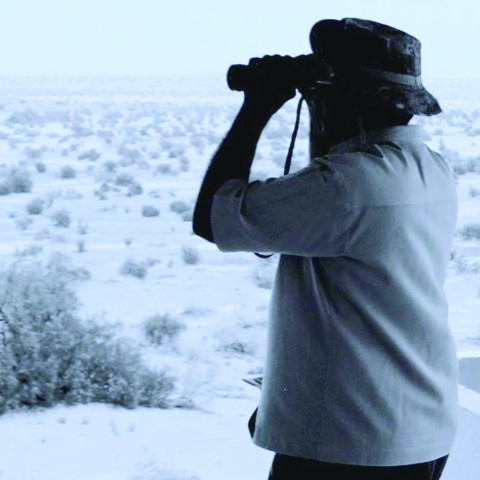The conservator: One man’s struggle to protect Sindh's wildlife
Javed Mahar has planted over 500,000 trees, besides rescuing thousands of birds and animals from poachers

Born and raised in a village deprived of basic facilities, he completed his primary and secondary education with distinction. Later, he moved to Jacobabad to pursue higher education, but failed to secure admission in a medical college.
With limited career opportunities, Mahar chose to go down a path less travelled. "People laughed at me when they heard of my decision to make a career in forestry and wildlife conservation," reminisced Mahar. That was 24 years ago and he has never looked back since.
At the age of 21 year, Mahar joined the Sindh Forest Department through the Sindh Public Service Commission (SPSC). He also passed several competitive exams, including the Central Superior Services, from 1993 till 1998, but preferred to live with birds, animals and their habitat.
He started his career as the Range Forest Officer in 1993 and became Sindh Wildlife Department's provincial conservator in 2015. In the last five years, one of the most remarkable initiatives he has done is to limit the smuggling of freshwater turtle.
Freshwater turtles
With formal education in agriculture, forestry and wildlife management, Mahar has safely released over 2,000 turtles over the last five years. "We lost thousands of our turtles," lamented Mahar. "Turtles' sighting almost disappeared. But no one can dare to hurt them now," he remarked, twisting his handlebar moustache. "Officials posted at exit routes know the value of our turtles."
Under his supervision, Pakistan became the first country in the world to carry out DNA barcoding of turtle meat when a container carrying over 4,000 freshwater turtles was being smuggled outside Pakistan in 2015. "People knew nothing about the value of freshwater turtles," he said.
Wildlife conservation termed national responsibility
Trapped wild birds
Until a few months ago, vendors asking for money to set free caged birds were a common sight at almost every major traffic intersection in Karachi. The practice has all but ceased, thanks to the efforts of Mahar.
Interestingly, the Sindh Wildlife Department used to issue permits to capture and sell wildlife birds to just about anyone. In recent time, however, the department has imposed a ban, warning traders not to trap wild birds, such as sparrows, weavers, bulbul and myna. Over 40,000 trapped wild birds have been safely released and officials now keep strict vigilance over such illegal activities.
"Countless birds were being trapped regularly," said Mahar. "We have to protect our birds, not just from the effects of climate change, but also opportunistic vendors who trap and sell them for nothing." He said the results of the ban will soon be observed as the metropolis will get back its lost birds.
Indus dolphins
Mahar also specialises in the conservation of the Indus Dolphin. Fishermen living around the Indus River have been sensitised and trained to safely release any trapped blind dolphins in their fishing nets. In last five years, at least 16 Indus Dolphins have been released back into their habitat. "We are trying our best to conserve our natural environment," reasons Mahar. "It's important to keep animals and birds in their habitat and if disturbed, they will ruin the entire chain."
Plantations
And yet, Mahar's successes are not limited to the conservation of animals and birds. He believes that without protection, supervision, development and management of natural resources of forest land, wildlife cannot survive and flourish.
Pakistan’s wildlife: Going, going, gone!
During his career spanning 24 years in the forest and wildlife departments, Mahar has individually planted around 512,000 trees in Ghotki, Sukkur, Dadu and Karachi. Over 8,000 acres of land has been made green with blocked plantation through his efforts.
"It was a proud moment for me when I 'googled' Sindh's forest cover till 2007," he recalled. But the good news was short-lived. "The green belt disappeared in 2009 and I couldn't do anything to save the forests," he lamented. According to Mahar, a mafia was behind the deforestation.
Over the years, Mahar has imposed Rs10 million in fines on woodcutters for felling his trees. "It certainly pays and keeps the wood cutters away from such illegal activities, but the real success would be when people would own their trees. Without trees, we can't inhale pure oxygen."
One of Mahar's most remarkable achievements is the Sufi Anwar Shah Safari Park (SASSP) located along the National Highway near Ghotki. It is a state of the art park that is home to a number of endangered species.
The SASSP is spread over 2,400 acres of land and was established in 2008. "It is a matchless project in Pakistan," Mahar says, beaming with pride. "If you visit, you'll understand what I mean when I say 'nature pays back'."
This story is part of a weekly series that seeks to bring to light the unsung heroes of Karachi - the hawkers, traders, doctors, teachers, engineers, lawyers and daily-wage labourers. It is they who make Karachi the city of lights.
Published in The Express Tribune, July 29th, 2019.












1724319076-0/Untitled-design-(5)1724319076-0-208x130.webp)






COMMENTS
Comments are moderated and generally will be posted if they are on-topic and not abusive.
For more information, please see our Comments FAQ